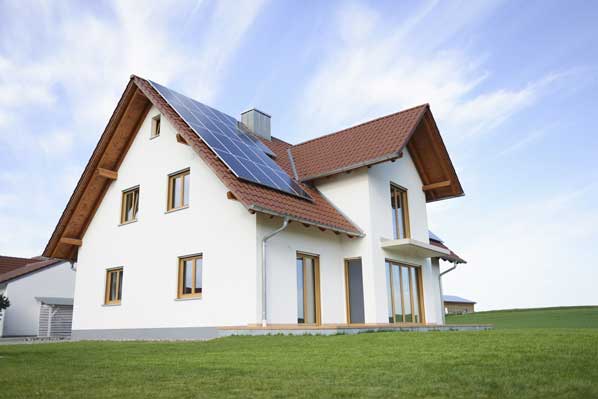
Could your property value be enhanced and the house become more saleable be with the benefit of solar panels and reduced energy bills? Putting property values top one side, in this article by Lisa Salmon (Press Association), she examines some good reasons to consider a solar panel installation.
Sunlight is free, so why not harness its energy through solar panels on your home?
Most people would love to save money on their domestic energy bills, and the summer is the ideal time to do it.
And that’s not just because you don’t need the heating on. It’s because all that sunlight is producing huge amounts of energy, which can be harnessed if you have solar panels on your home.
While a decade ago solar energy provided virtually no power, around 840,000 homes in the UK now have solar panels – also known as photovoltaics (PV) – and the renewable energy source regularly generates around a fifth of the country’s electricity for hours on summer days. The spell of hot, dry summer weather has helped break several solar power-generation records, and recently even very briefly eclipsed gas power stations, as the UK’s top source of electricity.
However, the solar energy boom may already have reached it’s peak, as solar panel installations have flatlined recently because financial incentives for householders to get them installed have been slashed dramatically, and will stop completely next year with no sign of a replacement scheme.
But green campaigners desperately want solar power to keep its foothold in the energy market, and point out there are still many reasons to consider installing solar panels on homes.

1 Solar panels can save you money
The Energy Saving Trust (EST), an independent consumer body which helps householders and businesses save energy, says the amount saved depends on several factors – where your home is, what direction your roof faces, how big a system you install, when you install it, and how much of the energy produced you’re able to use yourself. For a typical 4kW system in the south of England, you could make around £275 a year in feed-in tariff generation payments and export payments.
Use the EST’s online Solar Energy Calculator (energysavingtrust.org.uk) to assess what financial benefits you may get from installing a solar PV system.
You’ll also save on electricity bills, says the EST. The amount you save depends on how much energy you use in a day when your solar panels are generating energy. If you’re usually out all day, you’ll only save around £90 a year on your bills. However, if you tend to be at home, you could save around £220 a year. Including the benefits from tariffs, this would give you a total saving of around £365-£495, depending on your lifestyle.
Caitlin Bent, home energy expert for the EST, says: “Solar panels are most suited to people who are at home a lot during the day, who can really take advantage of using free electricity when the sun is shining.”
2 You get paid for energy you produce
As well as saving on electricity bills, you can make money in two other ways with solar panels. Firstly, through the feed-in tariff, you’re paid for every unit of energy you generate. The feed-in tariff will close to new applicants in April 2019, although payments will continue for 20 years from the date of installation for those who invest in solar panels before April.
Secondly, you can make money via the export tariff, through which you’re paid for any energy you don’t use but send back to the grid. However, because export isn’t metered for domestic properties, the government assumes you’ll export 50% of the energy you produce. This means regardless of how much you use, you’ll be paid for 50% of your generation.
3 You’re helping to save the planet
Solar electricity is green renewable energy, meaning it doesn’t release any harmful carbon dioxide or other pollutants. A typical home solar PV system could save around 1.2 to 1.7 tonnes of carbon per year. The EST says: “By generating clean, green electricity you reduce your home’s carbon emissions. Plus, any solar energy you don’t use will be fed into the grid, so it can be used by someone else.”
4 Costs have fallen
A typical 4kW solar PV system now costs around £5,500 – £6,800 on average, according to government figures. When the feed-in tariffs began in 2010, costs were as high as £12,000-£14,000.
5 You can store solar energy on batteries
Batteries can now be purchased by householders to enable them to consume rather than export their solar electricity, which makes more financial sense.
6 It’s possible to use solar tiles if you prefer
Solar tiles are designed to be used in place of ordinary roof tiles. However, a system of solar tiles will typically cost about twice as much as an equivalent panel system. Therefore, solar tile systems aren’t normally as cost-effective as panel systems, and are usually only considered where panels aren’t appropriate for aesthetic or planning reasons.
7 They’re low maintenance
Solar panels require relatively little maintenance, but you may need to wash the surface occasionally, and make sure trees don’t begin to overshadow them, to make sure they continue working at their most efficient. Debris is more likely to accumulate on ground-mounted panels, and roof panels that are tilted at 15 degrees or more will be cleaned by rainfall. Panels should last 25 years or more, but their inverter is likely to need replacing at some point sooner, at a cost of about £800.
8 They come with a guarantee
“The performance of solar panels will degrade slightly over time,” says Bent, “but most come with a guarantee of at least 25 years.”
If you are a house buyer looking for a home with solar panels, why not undertake a property search from our home page
